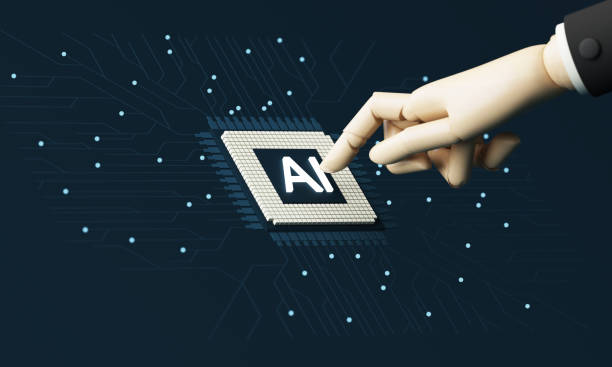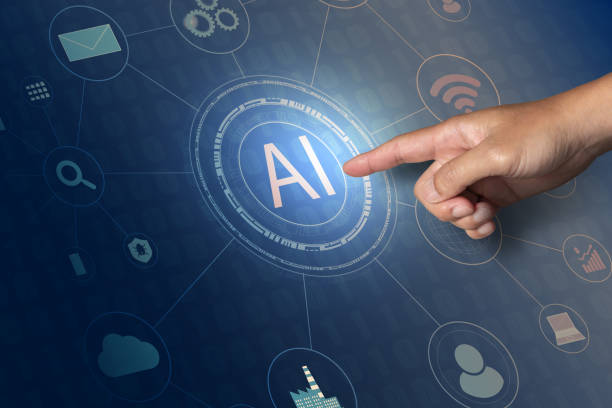What is Artificial Intelligence: An Introduction?

#Artificial_Intelligence, often abbreviated as AI, is one of the most exciting yet challenging fields of technology in the current century.
This scientific discipline focuses on building machines capable of mimicking, learning, reasoning, and problem-solving like humans.
The main goal of AI is to create systems that can perform tasks traditionally requiring human intelligence, including speech recognition, decision-making, language translation, and pattern identification.
This technology goes beyond a mere scientific concept and is rapidly permeating various aspects of our lives.
From smartphones to self-driving cars and big data analytics systems, the footprint of Artificial Intelligence is clearly visible.
Understanding its fundamental principles and applications is essential for everyone in the current era, as this knowledge not only enhances the ability to analyze and predict technological trends but also helps us adapt to future developments and seize new opportunities.
This section provides an explanation of the fundamental concept and initial potentials of this amazing field.
Does your current corporate website present a worthy image of your brand and attract new customers?
If not, transform this challenge into an opportunity with RasaWeb’s professional corporate website design services.
✅ Significantly improves your brand credibility and image.
✅ Paves the way for lead and new customer acquisition.
⚡ For free and specialized consultation, contact RasaWeb now!
The Evolution of Artificial Intelligence: A Historical Overview

#The_history and #evolution_of_Artificial_Intelligence is an eventful story of scientific ideas, technological advancements, and unsolved challenges.
The roots of AI can be found in the thoughts of ancient Greek philosophers about thinking machines, but its true turning point dates back to the 1940s and 1950s.
At that time, with the advent of the first electronic computers and the concept of computational intelligence, scientists like Alan Turing, by posing the question ‘Can machines think?’, laid the groundwork for the formation of this field.
In the summer of 1956, at the Dartmouth Conference, the term ‘Artificial Intelligence’ was officially coined, and this field began to attract investment and researchers.
Periods of ‘AI winters,’ accompanied by budget cuts and unrealistic expectations, could not hinder its progress.
In recent decades, with the emergence of big data, high processing power, and the development of deep learning algorithms, Artificial Intelligence is experiencing its golden age.
Recent advancements in machine learning and neural networks have enabled AI systems to perform complex tasks with unprecedented accuracy, including facial recognition, natural language processing, and even art generation.
This evolution demonstrates the immense potential and resilience of this field in facing challenges.
Types of Artificial Intelligence: From Narrow to General

#Artificial_Intelligence_classification helps us better understand the range and various capabilities of this technology.
Generally, AI can be divided into three main categories: Narrow AI (or Weak AI), General AI (or Strong AI), and Superintelligence AI.
Narrow AI, which we see most commonly applied today, is designed to perform specific and limited tasks.
Examples include voice assistants (like Siri and Alexa), recommender systems on streaming platforms, and chess-playing algorithms.
This type of AI is highly capable in a particular domain but cannot generalize its knowledge to other areas.
General AI refers to a system that can perform any intellectual task a human can.
This type of AI is capable of learning, understanding, and applying intelligence across a wide range of problems and environments, not just in a specific domain.
Currently, General AI is still a theoretical concept, and extensive research is underway to achieve it.
Superintelligence AI goes beyond general intelligence and refers to a system that surpasses the smartest human minds in all aspects, including scientific creativity, general intelligence, and social skills.
This concept falls more into the realm of science fiction but has raised serious philosophical and ethical discussions about the future of humanity.
Understanding these distinctions is essential for truly grasping the potentials and limitations of AI today and in the future.
Below, a table is provided to better explain these classifications:
| Type of AI | Capabilities | Examples/Current Status |
|---|---|---|
| Narrow AI | Performs specific and limited tasks, without true understanding. | Voice assistants, recommender systems, chess games. (Currently dominant) |
| General AI | Ability to learn and apply intelligence in any intellectual domain like humans. | Theoretical concept; under development and the ultimate goal of much research. |
| Superintelligence AI | Surpassing human intelligence in all dimensions. | Purely theoretical and science fiction; requires deep ethical discussions. |
Applications of Artificial Intelligence in Everyday Life

#Applications_of_Artificial_Intelligence in our daily lives are more widespread and diverse than we imagine.
This technology operates silently but effectively behind many services we use every day.
One of the most prominent applications is in virtual personal assistants like Siri, Google Assistant, and Alexa, which use natural language processing and machine learning to answer our questions, manage schedules, and simplify daily tasks.
In the healthcare sector, AI assists doctors in early disease diagnosis through medical image analysis, provides personalized treatment plans, and even plays a role in the discovery of new drugs.
The transportation industry is also undergoing a transformation with the emergence of self-driving cars that rely on AI for navigation, obstacle detection, and real-time decision-making.
In the financial sector, AI algorithms are used for fraud detection, risk management, and providing automated financial advice.
Even in entertainment, streaming platforms like Netflix and Spotify leverage AI to recommend movies, music, and personalized content based on user preferences.
These applications not only increase efficiency and convenience but also allow us to access information and services that were previously unimaginable.
However, the advancement of AI in these areas also raises questions about data privacy and cybersecurity, which require special attention.
Are you dissatisfied with the low sales of your e-commerce website?
RasaWeb is your solution for having a professional and high-selling e-commerce website.
✅ Significant increase in sales and revenue
✅ Easy and enjoyable shopping experience for customers
⚡ Get a free consultation from RasaWeb now!
Challenges and Ethical Considerations of Artificial Intelligence

#Challenges_of_Artificial_Intelligence and its #ethical_considerations are among the most important topics raised with the rapid advancement of this technology.
Alongside all the benefits of AI, there are also serious concerns about its long-term impacts on society.
One of the primary concerns is the issue of employment.
With the automation of many tasks by AI systems, there is a fear that many jobs will be eliminated, leading to widespread unemployment.
While AI can create new jobs, the speed and scale of changes can confront society with adaptive challenges.
Another important issue is algorithmic bias.
AI systems make decisions based on the data they are trained with.
If this data itself contains human or social biases, the algorithms will reproduce and even amplify these biases, which can lead to discrimination in employment, loan approvals, or even criminal justice.
Data privacy and cybersecurity are also concerns, as AI systems have access to vast amounts of personal data, and maintaining the security of this information is vital.
Accountability for decisions made by AI, especially in sensitive areas such as self-driving cars or autonomous weapon systems, raises complex ethical questions.
Developing comprehensive legal and ethical frameworks to guide the development and deployment of AI is essential to ensure that this technology benefits humanity and prevents its destructive potential.
The Future of Artificial Intelligence and Emerging Trends

#The_future_of_Artificial_Intelligence is full of unparalleled potentials and emerging trends that can add new dimensions to human life.
AI is expected to increasingly penetrate every industry and become the main engine of innovation.
One of the key trends is the development of Explainable AI (XAI).
This field seeks to create AI systems that not only make decisions but can also explain their decision-making process.
This will significantly help increase user trust, improve debugging, and adhere to legal and ethical standards.
AI in the field of creativity is also advancing, with the emergence of tools capable of generating text, images, music, and even code.
This “Generative AI” has the potential to transform creative and educational industries.
Furthermore, AI will expand into Edge AI environments, where data processing occurs close to the data collection source.
This leads to reduced latency, increased privacy, and greater efficiency.
Additionally, the convergence of AI with other technologies such as the Internet of Things (IoT), 5G, and blockchain will create smarter ecosystems capable of collecting, analyzing, and reacting to data on unprecedented scales.
These analytical trends not only indicate the path of AI’s progress but also make responsibility and precision in developing this technology more crucial than ever.
The Impact of Artificial Intelligence on Various Industries

#The_impact_of_Artificial_Intelligence on various industries is undeniable, and almost no sector of the global economy will remain unaffected by it.
This technology acts as a powerful catalyst, not only optimizing processes but also creating new business models.
In the healthcare industry, AI plays a vital role in more accurate disease diagnosis, designing new drugs, and providing personalized treatment plans.
Intelligent systems can analyze patient data and assist physicians in complex decision-making.
In the financial sector, AI is used for risk analysis, fraud detection, and algorithmic trading.
Banks and financial institutions use AI to improve customer service, personalize financial products, and enhance transaction security.
The manufacturing industry is also seeing increased efficiency and reduced costs by using AI in robotics, predictive maintenance of machinery, and supply chain optimization.
In education, AI can personalize educational content based on individual student needs and help teachers assess performance and identify student strengths and weaknesses.
Agriculture, transportation, retail, and even art are benefiting from this technology and are undergoing profound transformations.
The impact of AI goes beyond simple optimization; this technology is redefining industry structures, creating new opportunities, and fundamentally transforming the way we work and live.
Below, a table is provided to display the applications of Artificial Intelligence in some key industries:
| Industry | AI Applications | Examples |
|---|---|---|
| Healthcare | Disease diagnosis, drug discovery, personalized treatment. | Radiology image analysis, surgical robots, medical consultation platforms. |
| Finance | Fraud detection, risk management, algorithmic trading. | Banking chatbots, automated credit scoring systems. |
| Manufacturing | Automation, predictive maintenance, supply chain optimization. | Collaborative robots in production lines, machine vision-based quality control systems. |
| Education | Personalized learning, automated assessment, educational assistants. | Adaptive learning platforms, automated assignment grading. |
Essential Skills for Entering the World of Artificial Intelligence

#Artificial_Intelligence_skills for entering and succeeding in this growing field require a combination of theoretical knowledge and practical skills.
Given the expansion of AI into various industries, the demand for specialists in this field has sharply increased.
The first step for enthusiasts is mastering mathematical and statistical fundamentals; linear algebra, differential and integral calculus, and statistics and probability are the main pillars of many AI algorithms.
Programming, especially the Python language, is a vital skill, as Python, with its rich libraries (such as TensorFlow, Keras, and PyTorch), is the primary tool for AI developers.
A deep understanding of machine learning and deep learning concepts, including neural networks, decision trees, and regression, is essential for designing and implementing intelligent models.
Furthermore, the ability to work with data (Data Science), including data collection, cleaning, analysis, and visualization, is highly important, as data is the main fuel for AI.
Soft skills such as problem-solving, critical thinking, creativity, and the ability to continuously learn are equally important, as the field of AI is rapidly changing and evolving.
For those seeking a career in this field, participating in specialized training courses, practical projects, and studying up-to-date resources is crucial to becoming a skilled AI professional.
Does your company website create a professional and lasting first impression in the minds of potential customers? RasaWeb, with professional corporate website design, not only represents your brand’s credibility but also opens a path for your business growth.
✅ Creating a powerful and trustworthy brand image
✅ Attracting target customers and increasing sales
⚡ Get a free consultation
Limitations and Misconceptions about Artificial Intelligence

#Limitations_of_Artificial_Intelligence and common #misconceptions are among the important topics that must be addressed for a realistic understanding of this technology.
Despite significant advancements, AI still has fundamental limitations.
One of the most important is the lack of true understanding and consciousness.
AI systems can recognize patterns and perform complex tasks, but they lack intuitive understanding, emotions, or consciousness.
They operate purely based on the data and algorithms they were trained with and cannot think creatively or intuitively like humans.
Another common misconception is the fear of superintelligent AI taking over the world.
While superintelligence AI is a theoretical concept, today’s AI is very narrow and limited to specific tasks.
Concerns about ‘robot uprisings’ mostly reside in the realm of science fiction and are far removed from current technical realities.
AI also cannot make complex ethical or value-based decisions unless these values are explicitly embedded in its training data or algorithms.
This technology requires a vast amount of data for training, and its performance severely declines if data is scarce or of poor quality.
AI’s limitations in ‘common sense’ are also notable; systems cannot simply understand basic concepts that humans naturally grasp.
This understanding of limitations helps us to have more realistic expectations of AI and to focus on its responsible and safe development.
The Future and Convergence of Artificial Intelligence with Other Technologies

#The_future_of_Artificial_Intelligence is defined not only by its internal advancements but also by the #convergence_of_AI with other advanced technologies.
These combinations have the potential to create unprecedented innovations that can transform how we interact with the world around us.
One of the most important convergences is the combination of Artificial Intelligence with the Internet of Things (IoT).
IoT devices can collect vast amounts of data from the physical environment, and AI analyzes this data and converts it into actionable insights.
This combination leads to the creation of smart cities, smart homes, and automated industrial systems that can make decisions and act autonomously.
The convergence of AI with blockchain also has the potential to increase transparency, security, and trust in AI-based systems, especially where data traceability or proof of origin is required.
In the realm of Virtual Reality (VR) and Augmented Reality (AR), AI can personalize and smarten user experiences, including creating interactive environments and more realistic avatars.
Furthermore, AI’s collaboration with robotics will lead to the production of a new generation of intelligent and autonomous robots capable of performing more complex tasks in dynamic environments.
These convergences not only contribute to the advancement of the technologies themselves but also pave the way for creating comprehensive and integrated solutions for global challenges, including in the areas of energy, environment, and health.
These converging trends represent an exciting and opportunity-filled outlook for the future.
Frequently Asked Questions
| Question | Answer |
|---|---|
| What is the definition of AI (Artificial Intelligence)? | It is a field in computer science that aims to create intelligent machines capable of thinking, learning, problem-solving, and making decisions like humans. |
| Mention some common applications of Artificial Intelligence. | These include self-driving cars, voice assistants (like Siri and Alexa), recommendation systems (like Netflix and Amazon), facial recognition, and medical diagnosis. |
| What is the difference between Narrow AI (ANI) and General AI (AGI)? | Narrow AI is specialized in one specific task, while General AI possesses human-level intellectual ability to perform any cognitive task. |
| What is Machine Learning and its relationship with Artificial Intelligence? | Machine Learning is a branch of Artificial Intelligence that focuses on developing algorithms that allow systems to learn from data without explicit programming. |
| What are Artificial Neural Networks? | They are computational models inspired by the structure and function of the human brain, used in deep learning to process data and discover complex patterns. |
| Mention some ethical challenges related to Artificial Intelligence. | These include privacy issues, bias in data and algorithms, job displacement, and accountability in case of errors or unfair decisions. |
| What is Natural Language Processing (NLP)? | It is a branch of Artificial Intelligence that focuses on enabling computers to understand, interpret, and generate human language in a useful and interactive way. |
| How can Artificial Intelligence affect the job market? | It can lead to the automation of some routine tasks, requiring retraining of workers and creating new jobs in the fields of designing, developing, and maintaining AI systems. |
| What is Computer Vision? | It is a field in Artificial Intelligence that enables computers to ‘see,’ understand, and interpret images and videos in the same way humans do, allowing them to recognize objects and faces. |
| What is the importance of data in developing Artificial Intelligence systems? | Data is the fuel that powers AI systems, especially in Machine Learning. The quality and quantity of data significantly affect the accuracy and performance of models and their ability to learn and make correct decisions. |
And other advertising services from RasaWeb Advertising Agency:
Smart Marketplace: A professional solution for increasing sales with a focus on optimizing key pages.
Smart Direct Marketing: Transform user engagement with SEO-driven content strategy.
Smart Website Development: A professional solution for user engagement focusing on SEO-driven content strategy.
Smart Custom Software: A fast and efficient solution for improving SEO rankings with a focus on SEO-driven content strategy.
Smart Advertising Campaign: Designed for businesses looking to manage campaigns through attractive UI design.
And over hundreds of other services in the field of online advertising, advertising consulting, and organizational solutions
Online Advertising | Advertising Strategy | Advertorials
Resources
Future AI Trends on Digiato
Fundamental Concepts and Applications of AI on Zoomit
The Impact of AI on Life on Mizbanfa
Understanding AI Types on Techrato
? Are you ready to transform your business in the digital world? RasaWeb Afarin Digital Marketing Agency, specializing in corporate website design and offering comprehensive online marketing solutions, is by your side to ensure a powerful and impactful web presence.
📍 Tehran, Mirdamad Street, next to Bank Markazi, Southern Kazeroon Alley, Ramin Alley, No. 6




